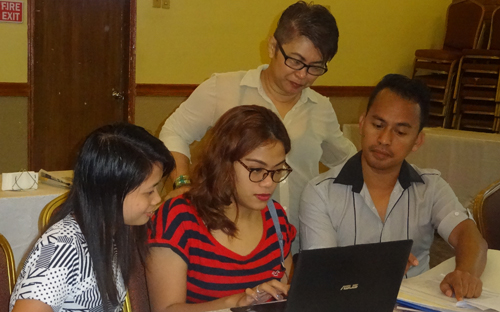 Financial Management Specialist Stella Maris P. Salas discusses the reasons why internal control fails during the Clusterwide Simplified Financial Management Training held on December 7-10, 2015 at Villa Caceres Hotel in Naga City.
Financial Management Specialist Stella Maris P. Salas discusses the reasons why internal control fails during the Clusterwide Simplified Financial Management Training held on December 7-10, 2015 at Villa Caceres Hotel in Naga City. Bicol PPMIUs, proponent groups of PRDP I-REAP sub-projects equipped on financial management
December 10, 2015
Begin with the end in mind. This is how the Philippine Rural Development Project (PRDP) conducts business by putting systems in place prior to project implementation.
To ensure the sustainability of approved business enterprise under the Agro-Industrial Enterprise Development (I-REAP), a Clusterwide Simplified Financial Management Training was conducted on December 7-10, 2015 at Villa Caceres Hotel in Naga City. The activity aimed to develop the financial management capability of proponent group (PG) leaders who will run the business enterprise to be funded by PRDP as well as equip them in safeguarding and managing their financial resources. Present during the activity were the proponent groups (PG) and Provincial Project Management and Implementation Unit (PPMIU) representatives of Albay, Camarines Sur and Camarines Norte.
“By improving the financial management system of the proponent groups, they can attain sustainability,” Stella Maris P. Salas, Financial Management Specialist, said. Salas stated that financial management is one of the key pillars in business management. “Without it, the business won’t prosper,” she added.
Salas and consultant Crisanto B. Gastardo Jr. facilitated and acted as resource speakers at the training which equipped the participants in profiling, work and financial plan preparation, and planning and budgeting. They also trained the participants on accounting for fund receipts and disbursements, adopting internal control systems, financial reporting and government reportorial requirements. Moreover, workshops on financial statement analysis and bank recon as well as conducting internal audit and inventory were conducted.
“We tackled the full components of financial management–planning, bookkeeping, interpreting the results, formulating policies and guidelines that would constitute internal control measures,” Gastardo said.
He added that since financial management involves people, they must be trained to be competent and must possess integrity prior to deployment.
“They must be trained on the systems involved, practices and procedures, and standard forms that will capacitate them in the performance of their roles and responsibilities,” he added.
Meanwhile, Salas underscored that effective and efficient financial management requires adequate and competent staff, audit, internal control, financial reports matched with outputs, timely and accurate report and good filing system.
According to Lucy B. Buena, chairman of the Federation of Baao Women (FBW) Multi-Purpose Cooperative, the financial management training enlightened her management team on the right procedures of conducting business transactions.
“I’ve learned that somebody should be assigned in monitoring the disposal and inventory of the products,” she said.
Meanwhile Josias B. Pedrocello, chairman of the Tunay Tapat Lahing Pilipino Cooperative (TTLPC), said that the financial management training informed him of the changes in the record-keeping system.
Rey A. Lucis, project manager of the Samahang Organik/Fair Trade Coconut Farmers Bicol-Quezon (SOFACOFA), said that he gained insights on proper record-keeping of debit and credit and sales through the financial management training.
Gastardo recommended that the three organizations be closely monitored and be given follow through mentoring to regularly review their financial records and financial performance as they still need in-depth understanding of financial management and internal control methods to mitigate risks.
“Hopefully, a similar forum to follow up what has changed, improved and adopted as new ways of doing things will be conducted,” he said.
Furthermore, Salas and Gastardo stated that handling similar training with certified public accountants present is one of the best practices employed in Mindanao that the region can adopt.
“The PG targets the least, last and marginalized. We hope that the project benefits will be trickled down and benefit all members,” Salas remarked.
Bicol has the most number of I-REAP sub-projects with No Objection Letter 1 in the South Luzon cluster namely the Albay Coco Geonets Manufacturing Enterprise, Coco Geonet Production Project in Camarines Norte and Camarines Sur Coco Sap Sugar Processing Center. I-REAP is one of the four major components of PRDP designed to strengthen and develop viable agri-fishery based enterprises to achieve the PRDP objectives of increasing farmers’ income in project areas and developing a more market-oriented and climate-resilient agri-fishery sector. (Annielyn L. Baleza, I-SUPPORT InfoACE Unit, DA-RAFIS 5)
Business Development Officer Victoria Eugene S. Florece (center, standing) and consultant Crisanto B. Gastardo Jr. (1st from right, seated) assist SOFACOFABQ bookkeeper Jessica S. Ramos and SOFACOFABQ treasurer Venus C. Pedernal in a workshop on recording fund receipts and disbursements.


